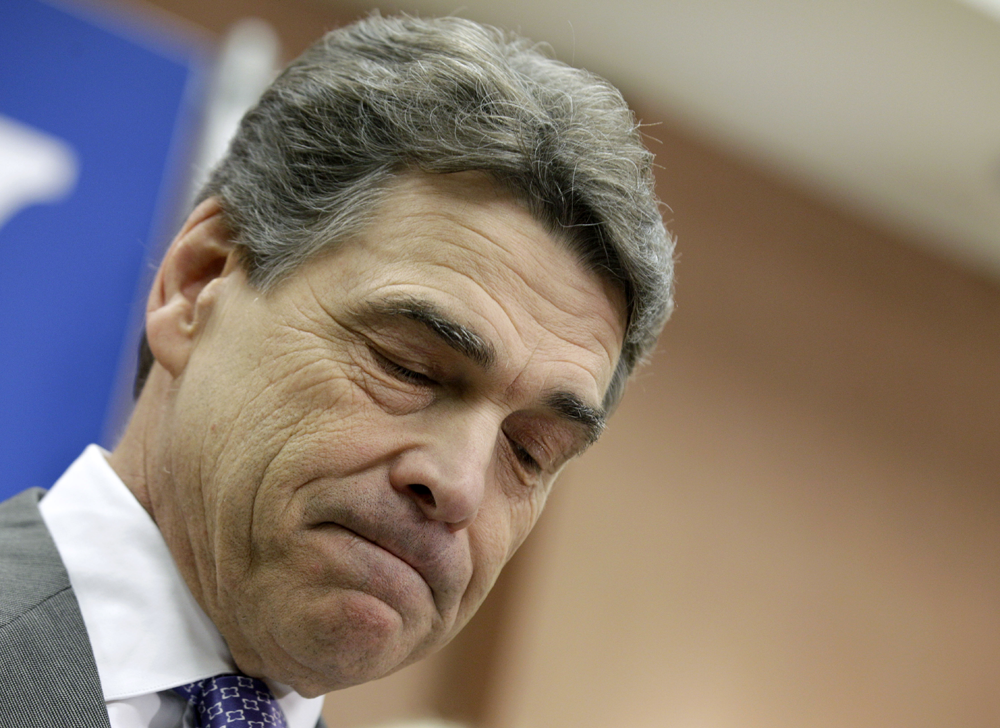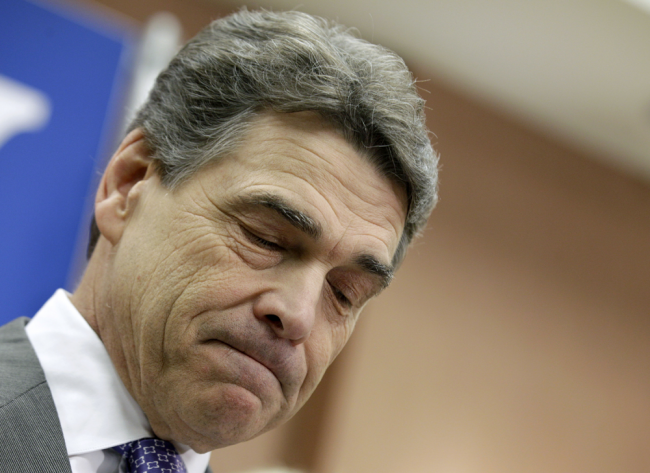
Republican presidential candidate, Texas Gov. Rick Perry pauses while announcing he is suspending his campaign and endorsing Newt Gingrich, Thursday in North Charleston, S.C. (Associated Press)
The Rick Perry for President campaign has come to an end. In the coming days and weeks, the campaign’s demise will be dissected thoroughly.
The commentariat will offer sundry opinions on why his bid for the presidency failed. The implications for Texas and for the Republican Party are sure to be of considerable consequence.
It certainly seems to me that the national stage proved too big for Perry, and he found his deficiencies exposed beneath the glare of a great spotlight.
The “Strong” ad aired by the campaign will be viewed as an embarrassing and shameful historical artifact of bigotry at its worst, worthy of all the condemnation it received nationally and more.
However, rather than engage in the typical analysis of “politics as a horse race” that our national political conversation has become, I would like to step back from partisan considerations for a moment and consider what the Rick Perry campaign says about us as a country culturally, and more specifically, about our complex relationship with leaders.
The Perry campaign, and more specifically Rick Perry himself, proves instructive in a universal way on the nature of leadership.
It would be a Herculean task to find an individual who more completely “looks the part” of President than Rick Perry (Mitt Romney lacks a certain self-assured insouciance, an impossible effortlessness that the American President must have to truly capture the popular imagination).
Possessed of idealized good looks befitting the classic image of “the President,” an undeniable swagger communicative of a boundless reservoir of self-confidence, and a personal magnetism that establishes his presence in any room, Perry looks like the handsome leader that should hold elected office.
However, this individual sent straight from central casting to play the part of the governor, of the president, revealed himself to be merely that: an actor.
Perry serves as a case study in what we want our leaders to be. To a frighteningly significant degree, the fact that Perry looks like the President has been the foundation of and the driving force in his political career.
It is a basic truth of humanity: people want to be led. Even in a country like the United States where personal independence, and self-reliance are venerated above almost all other values, people want to be led.
However, people do not want to be led by just anybody. They want to be led by a man blessed with masculine good looks and a powerful voice.
They want to be led by a man that towers over those around him, in both physical height and force of personality.
They want to be led by a man that projects absolute confidence in the prudence of his decisions and in the safety of the country. They want to be led by a man that instills faith in the future. A man endowed with such gifts would be worthy of the sacred responsibility of leading the United States of America, at least according to the private inner thoughts of most citizens.
I am of the opinion that the visceral reaction Governor Perry’s campaign has elicited from the American people represents a sort of national self-reproach. In many ways, it seems that Rick Perry has forced voters to confront their own worst selves.
The man that looks the way we want the president to look, the man that so perfectly conforms to our shared national imagination of the president, has turned out to be incapable of performing the duties of our nation’s highest office.
“We the people” feel embarrassed and ashamed that the man who so precisely embodies the ideal leader we have crafted in the public consciousness should prove such an unmitigated failure.
“We the people” feel guilty for prizing image and appearances at the expense of substance and content.
“We the people” feel such humiliation because we realize that perhaps the real fault lies not with Rick Perry, but instead the real fault lies with us for seeking someone that looks like the leader instead of seeking someone that is the leader.
Chad is a senior majoring in finance with a specialization in alternative asset management.









